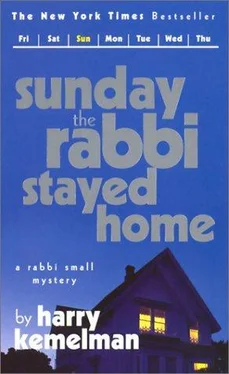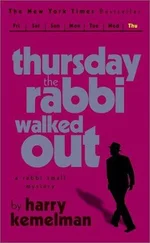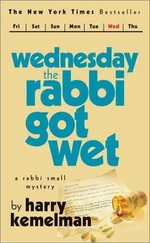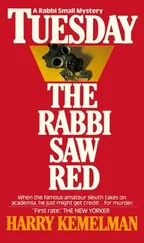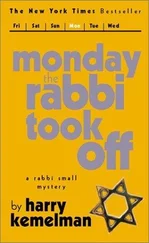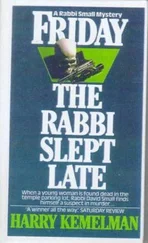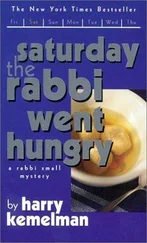Harry Kemelman - Sunday the Rabbi Stayed Home
Здесь есть возможность читать онлайн «Harry Kemelman - Sunday the Rabbi Stayed Home» весь текст электронной книги совершенно бесплатно (целиком полную версию без сокращений). В некоторых случаях можно слушать аудио, скачать через торрент в формате fb2 и присутствует краткое содержание. Город: New York, Год выпуска: 2002, ISBN: 2002, Издательство: iBooks, Жанр: Иронический детектив, на английском языке. Описание произведения, (предисловие) а так же отзывы посетителей доступны на портале библиотеки ЛибКат.
- Название:Sunday the Rabbi Stayed Home
- Автор:
- Издательство:iBooks
- Жанр:
- Год:2002
- Город:New York
- ISBN:978-0743452380
- Рейтинг книги:3 / 5. Голосов: 1
-
Избранное:Добавить в избранное
- Отзывы:
-
Ваша оценка:
- 60
- 1
- 2
- 3
- 4
- 5
Sunday the Rabbi Stayed Home: краткое содержание, описание и аннотация
Предлагаем к чтению аннотацию, описание, краткое содержание или предисловие (зависит от того, что написал сам автор книги «Sunday the Rabbi Stayed Home»). Если вы не нашли необходимую информацию о книге — напишите в комментариях, мы постараемся отыскать её.
Sunday the Rabbi Stayed Home — читать онлайн бесплатно полную книгу (весь текст) целиком
Ниже представлен текст книги, разбитый по страницам. Система сохранения места последней прочитанной страницы, позволяет с удобством читать онлайн бесплатно книгу «Sunday the Rabbi Stayed Home», без необходимости каждый раз заново искать на чём Вы остановились. Поставьте закладку, и сможете в любой момент перейти на страницу, на которой закончили чтение.
Интервал:
Закладка:
He wheeled around in his swivel chair. “Son of a bitch!”
“Begg? No two opinions on him,” said the patrolman. “Did I ever tell you about the time he—”
“I better call the cruising car,” the sergeant interrupted. “It would be just like him to keep tabs on the time. Hear me. Bob?… Hanks… When did you pass Tarlow’s Point?… Uh-huh… Well, take a run down there, will you? Old man Begg claims he saw a light there… No, just before the transformer blew… Okay.”
Chapter Twenty-Nine
They drove three in the front seat. Didi between the two boys. Stu turned the wipers to high speed to take care of the rain lashing against the windshield. “I sure don’t envy that Jenkins riding a motorcycle in this kind of weather.”
“Oh, he can always duck in someplace until it lets up.” said Jacobs.
They parked in front of Hillson House, and Stu dug a flashlight out of the glove compartment and snapped on the beam.
“Hey,” said Jacobs, “the door is open.”
“Maybe Moose woke up and just walked out.” said Stu hopefully.
“Could be, but we better take a look around. Here, let me have the flash.” Bill mounted the stairs with Stu behind him. He pushed open the front door and cast the light around the room. Then he led the way down the hall to the study, where they had left Moose. He stopped at the threshold and focused the beam on the couch. What looked like a giant cocoon in silvery white plastic was resting on top of it.
Stu giggled nervously. “Geez, you sure wrapped him good. What did you put it over his head for?”
But Jacobs was already at the couch. “We didn’t leave him like that. Help me!”
The figure was completely encased in the sheet, the top flap of which had been folded over the head and tucked tightly into the folds enwrapping the body.
Jacobs yanked at the flap frantically and then, with Stu’s help, pulled the rest of the sheet from the body. The face was curiously white. Jacobs felt the forehead and cheeks. They were cold. He handed the flashlight to Stu and began to rub the hands of the figure on the couch. Then he dropped them in distaste.
“What’s the matter?” Stu whispered. “I think he’s dead.”
He thrust his hand underneath the shirt to see if he could feel a heartbeat.
“You can’t tell that way.” said Stu. “You got to hold something like a mirror up to his lips.”
“I haven’t got a mirror.” said Bill savagely. “Put the lens of the flash to his mouth.”
Stu offered the flashlight, but Bill said, “Let’s get the hell out of here.”
They started to walk out and then broke into a run. They clattered down the steps and then raced to the car. Stu pulled the car door open while Bill ran around the front to the other side.
“Where’s Moose?” asked Didi as she moved over to let Stu get behind the wheel.
“Never mind.” He turned on the ignition, but before he could shift to DRIVE a car zoomed toward them, veered over, and came to a stop immediately in front, its headlights on high beam shining in their eyes. Stu’s door was pulled open by a policeman with a gun in his hand. “Hold it.” he commanded. “Now come out, all of you.”
Chapter Thirty
Harvey Kanter, Ben Gorfinkle’s brother-in-law, was ten years his senior. Although in private he was radical, atheistic, and irreverent, in public, as the managing editor of the Lynn Times-Herald, he was Republican, conservative, and a staunch defender of the status quo. He wrote editorials supporting book censorship, prayers in the schools, law and order in the cities, and attacked student rioting, the coddling of criminals, and the hippie movement. He was a tall, rangy man, with a shock of iron-gray hair brushed back impatiently. Everything about him was impatient. He was nervous, fidgety; he could not sit still; he either got up and paced the floor, or if he remained seated, he would slide forward to rest on the end of his spine or pull a leg under him or slouch around if the chair permitted it so that his head was on one arm and his legs on the other.
His attitude toward Gorfinkle tended to be mocking and derisive, and his wife, Edith, was also apt to be somewhat patronizing to her younger sister. Mrs. Gorfinkle. Nevertheless, the Gorfinkles came to dinner when they were invited, partly as a matter of habit and partly because in a perverse kind of way Ben Gorfinkle enjoyed the discussions.
After dinner the two men lounged into the living room while the women cleared the table and proceeded to wash the dishes. Kanter bit off the end of a cigar, and as he held a match to the end he said, “I heard your rabbi the other day. Did I tell you?”
“No.” said Gorfinkle cautiously. “When was that?”
“About a week ago. He was the speaker at the Chamber of Commerce meeting, save the mark.”
“I didn’t think you went to those.”
“Hell, the paper has to be represented, and I drew the short straw. Your man wasn’t bad.”
“What did he talk about?”
“Oh, the usual—the place of the temple in the modern world. Seems to me I’ve heard a dozen priests and ministers and such godly folk at one affair or another in the last six months, and all they talk about is the place of the church, or in this case the synagogue, in the modern world. I figure if they talk about it so much, it’s because it ain’t so, but your guy seemed to make some sense.”
“What did he say?”
“Oh, the point of his talk, as I remember it. was that the modern civilized world was finally coming around to the positions that the synagogue had been preaching for a couple of thousand years or more—social justice, civil rights, rights of women, importance of learning. His idea was that finally, after nearly two thousand years, the Jewish religion was coming into style.”
“That’s very interesting.” said Gorfinkle. “I had a long talk with him—just before I came here, as a matter of fact. And it was about somewhat the same subject, but he took what I thought was the opposite point of view in his discussion with me. I guess there are some people who can take either side of the discussion, depending on how it suits them,” he added.
“He didn’t strike me as that type of man.” said Kanter quietly. “What happened?”
“Well, you know, as in any organization, we have two parties—mine and what you might call the opposition, which is headed by Meyer Paff. You know him.”
“Yeah. I know him.”
“Well, we want the temple to get active in various movements that are current—like civil rights, for one. Paff s bunch want to keep it a place where—you know—you just come to pray on the High Holidays or on Friday nights. And I found out that the rabbi was carrying on some pretty active propaganda for the Paff group. So I had it out with him.”
“And how did it end?”
“I told him in no uncertain terms that I wasn’t going to stand for it and that the group that I represented—and we’re a clear majority—weren’t going to stand for it.” He leaned forward in his chair. “You see, what he was doing was talking to the kids—telling them that we were in the wrong. He’s kind of popular with the kids, and he was planning to use them to influence their parents.”
“How did he take it?”
“Oh, he got on his high horse and said no one was going to tell him what to say, that he was the rabbi and he would decide what was proper for him to say and what wasn’t.”
“So?”
Gorfinkle was pleasantly conscious that he had captured his brother-in-law’s interest and that, for once, what he was about to say would startle him out of his customary superciliousness. He smiled. “So I told him that I’d had a meeting with a majority of the board prior to our little talk and that we had decided that if he refused to go along, at the next meeting a motion would be offered—and passed—calling for his resignation.”
Читать дальшеИнтервал:
Закладка:
Похожие книги на «Sunday the Rabbi Stayed Home»
Представляем Вашему вниманию похожие книги на «Sunday the Rabbi Stayed Home» списком для выбора. Мы отобрали схожую по названию и смыслу литературу в надежде предоставить читателям больше вариантов отыскать новые, интересные, ещё непрочитанные произведения.
Обсуждение, отзывы о книге «Sunday the Rabbi Stayed Home» и просто собственные мнения читателей. Оставьте ваши комментарии, напишите, что Вы думаете о произведении, его смысле или главных героях. Укажите что конкретно понравилось, а что нет, и почему Вы так считаете.
